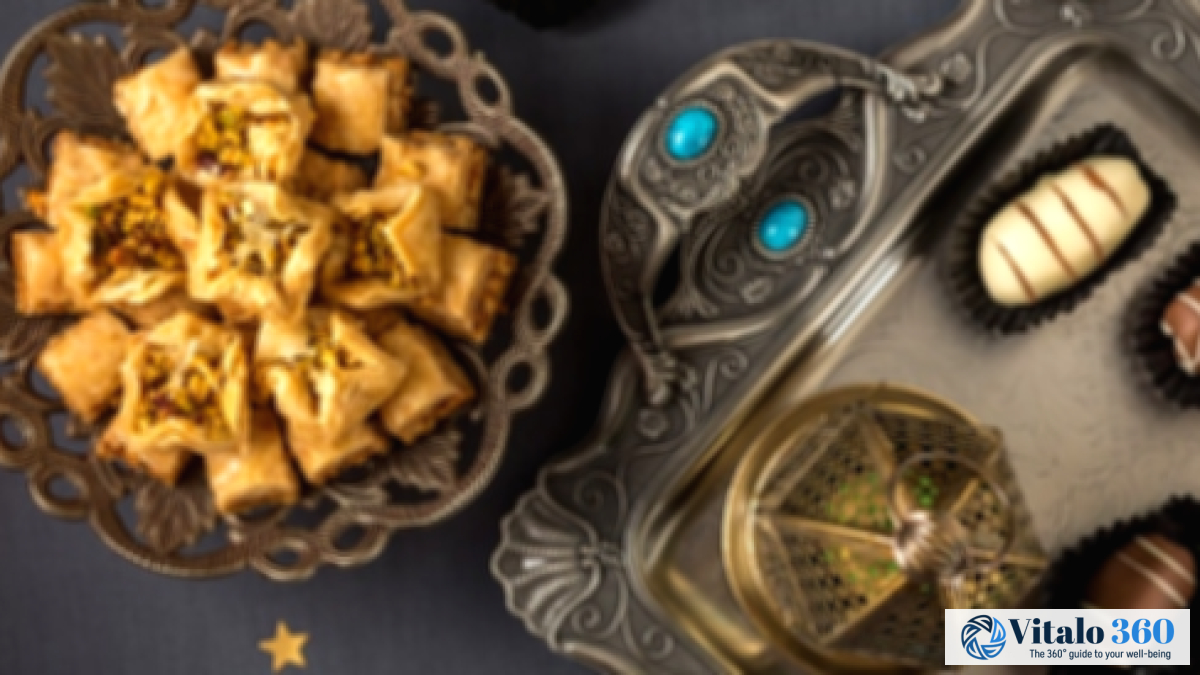.
Fasting during Ramadan, it’s kinda tricky to balance what we should and shouldn’t indulge in, right? Especially when it comes to certain foods and drinks that can actually make us feel worse – think dehydration, heartburn, and that oh-so-familiar sluggishness.
We’re gonna break down some of the main culprits, and trust us, it’s worth knowing what to avoid so you can feel your best this Ramadan. Let’s dive in!
- Foods & Drinks to Avoid in Ramadan
- Carbonated Drinks
- Salty Foods
- High-Sugar Sweets
- Pickles
- Fried Foods
- Processed Foods
- Spicy Foods
- Acids
- Caffeine
Foods & Drinks to Avoid in Ramadan
Here’s what we’re talking about:
Carbonated Drinks
A lot of people, like, *really* reach for those fizzy drinks at Iftar. Thing is, these drinks? Loaded with sugars and acids that can mess with your system. They might give you a temporary boost, but they can also cause bloating. Um, not fun. Better to stick to natural juices instead, y’know?
Consuming carbonated drinks on the reg is linked to an increased risk of sugar issues. Artificial sweeteners and additives? They mess with your insulin sensitivity and can make you more prone to sugar-related problems. So, yeah, maybe skip the soda.
Salty Foods
Salty foods are known for making your body hold onto water, which is exactly what you don’t want when you’re trying to stay hydrated. You gotta avoid these! They can make you super thirsty, especially during those long fasting hours.
And, let’s not forget that too much salt can raise your blood pressure because of the high sodium content. Avoiding salty foods during Ramadan? Definitely a good call.
High-Sugar Sweets
A Ramadan staple, but also a sneaky culprit: sweets after Iftar. Seriously, they’re a major contributor to weight gain during the holy month, but that’s not all.
It’s interesting to note that while traditional Ramadan sweets are undeniably tempting, health-conscious bakers and home cooks have begun experimenting with healthier alternatives. These include using natural sweeteners like dates or honey, incorporating whole grains, and reducing overall sugar content. This innovative approach allows individuals to enjoy the festive spirit of Ramadan treats without compromising their health goals, a win-win situation we all can appreciate!
These treats often have tons of harmful fats, like hydrogenated oils, which can cause clogged arteries. You want to avoid those to reduce heart-related risks.
We know it’s tempting. Sugar cravings? Real. Maybe try reaching for fruits with natural sugars. They’ll satisfy that sweet tooth *and* keep you hydrated.
Pickles
One of the food choices that are worth avoiding in Ramadan are pickles; this is because it is from the foods that retain water in the body. Because they’re usually high in sodium, they lead to thirst.
Fried Foods
If you’re trying to watch your cholesterol, steer clear of fried foods. It’s often cooked in hydrogenated oils, which are dangerous to your heart and blood vessels, and that’s an actual recipe for disaster, wouldn’t you agree?
After over 15 hours of fasting, your body needs nutrients, not a grease overload. Going for lighter, healthier options is definitely the way to go.
Processed Foods
Most types of fats on the human health iftar are the hydrogenated fats which are available in the processed foods.
Hydrogenated fats are complete disaster to health, such as: the hydrogenated vegetable oils, because it may cause high cholesterol in the body. So, you must know that its intake speeds up the process of arteries and blood vessels’ clog.
After fasting for more than 15 hours, the body is in need of replenishing the food sources that for sure it won’t get much of when taking the hydrogenated fats; therefore, it’s better to take balanced foods, and avoid the hydrogenated fats as much as possible.
Spicy Foods
Spicy foods can cause heartburn and mouth ulcers, because they contain a special substance, which is the spicy peppers (Capsaicin).
Also, don’t consume this food in the digestive system, as it may cause irritation to the colon and stomach, and which increases the feeling of thirst; because it increases the acidity and the need for drinking water.
Acids
You want to avoid acidity, because it causes heartburn, and therefore, you’ll suffer from gas and inflate the colon.
Heartburn counts as one of the common health problems that you may develop during Ramadan specifically due to indigestion, so, try to follow healthy dietary habits that you can follow during Ramadan especially, which are consistent with the stomach, and avoidance of overeating for long iftar periods.
Caffeine
One of the important drinks to avoid in Ramadan is caffeine; because it’s a diuretic, meaning that it speeds up the process of taking water out of the body, and eventually, it causes feeling thirsty and dry mouth.
This is in addition to it being a reason for having limited concentration, which, in turn, causes low blood sugar.
Key takeaways
- Cut back on sugary drinks and processed sweets, they might taste good now but you’ll regret it later with energy crashes and extra pounds.
- Ease up on the salt and spices; these are culprits for extreme thirst and digestive issues.
- Choose whole, unprocessed foods. They’re gentler on your system after a long day of fasting and provide lasting energy.
FAQ, Myth & Facts
Is it okay to drink coffee during Suhoor?
While it might seem like a good idea to get that caffeine kick, it’s generally better to avoid coffee during Suhoor. Caffeine is a diuretic, which means it can dehydrate you faster. This can lead to increased thirst throughout the day, especially when you’re fasting for an extended period.
Will eating dates really give me energy throughout the day?
Yes! Dates are an excellent source of sustained energy due to their natural sugars and fiber content. They provide a steady release of glucose into your bloodstream, preventing those energy crashes. Plus, they’re packed with essential nutrients like potassium and magnesium, which support overall health during Ramadan.
Does spicy food actually cause stomach ulcers?
Not directly. While spicy food can irritate the stomach lining, it doesn’t cause ulcers on its own. However, if you’re prone to acid reflux or have a sensitive stomach, it’s best to moderate your consumption of spicy foods to avoid discomfort.
Testimonials
“Last Ramadan, I made a conscious effort to avoid sugary drinks and processed foods. I felt so much more energized throughout the day, and I didn’t experience the usual afternoon slump. It made a huge difference in my overall well-being.”
“I used to load up on salty snacks during Suhoor, thinking it would keep me full longer. But all it did was make me incredibly thirsty! This year, I switched to foods with natural fats and fiber, and I felt so much better. No more unbearable thirst.”
“I have a sweet tooth, so Ramadan was always a struggle. I’d indulge in all sorts of sweets after Iftar, which would lead to weight gain and sluggishness. I began experimenting with healthier versions, and I could enjoy the treats without the guilt or the negative effects. It was a game-changer!”
So, there you have it! Avoiding these foods and drinks doesn’t mean you have to sacrifice all the joy from Ramadan, you just need to take care of what you put in your body. Maybe you won’t be as bloated or tired as you were last year, if so, we’ve done our job.









